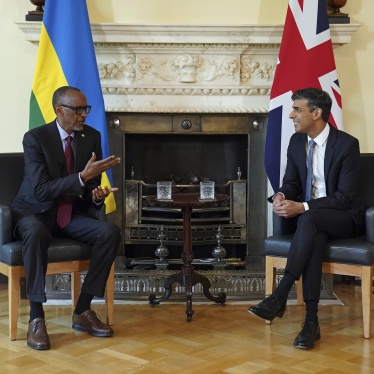(Johannesburg) – Angolan police routinely beat and extort street vendors during “removal operations” in the capital, Luanda, Human Rights Watch said in a report released today.
The 38-page report, “‘Take That Filth Away’: Police Violence Against Street Vendors in Angola,” describes how police officers and government inspectors, often in civilian clothes without identification, mistreat street traders, including many women with children, during operations to force them off the streets. Human Rights Watch interviewed 73 street vendors in Luanda who vividly described how police seize their goods, extort bribes, threaten them with imprisonment, and in some cases arrest them. Impunity for such abuses has been the rule.
“Every day police viciously beat and rob street traders in plain daylight and no one does anything about it,” said Leslie Lefkow, deputy Africa director at Human Rights Watch. “Abuse and robbery is no way to conduct police business.”
The government should immediately issue public orders to the police to stop the violence and ensure that any removal operations are conducted by professional officers operating with full respect for the law, Human Rights Watch said.
Police crackdowns on street traders have increased since October 2012, when the governor of Luanda declared that authorities would remove street vendors, Human Rights Watch said. Provincial authorities promised that new markets would be built for the vendors. These operations are part of a longer-term government policy to reduce the informal sector in post-war Angola, which also includes mass forced evictions from informal settlements. Both sets of removals have targeted some of Luanda’s poorest communities.
Many of the round-ups follow a similar pattern: government inspectors, usually carrying batons, and armed police officers approach groups of street vendors on foot, in cars, or by motorcycle. They then chase the vendors away, hitting them and seizing their goods.
Street vendors described to Human Rights Watch the violence during round-ups. They said that even pregnant women were routinely beaten with batons and other objects, kicked, slapped, and punched, resulting in injuries including bruises and swollen arms, legs, and faces.
“Where I sell there are many zungueiras [female street vendors] with babies on their backs,” a 22-year-old woman vendor told Human Rights Watch, “The police and fiscais [government inspectors] arrive on motorcycles. They kick us and throw our goods to the ground, sometimes they take them, unless we pay. They say, ‘Take that filth away. This is not a place to sell.’”
Journalists, family members, passersby, and other witnesses who try to intervene, complain, or document the abuses face arbitrary detention and beatings at the hands of police, Human Rights Watch said. A Human Rights Watch researcher was briefly detained in April when interviewing street traders.
This intimidation and harassment reflects Angola’s increasingly repressive environment for journalists and human rights defenders, Human Rights Watch said. Independent journalists report on police crackdowns at great personal risk and the state media will not cover the issue.
“Angolan authorities should immediately stop punishing journalists, human rights defenders, and concerned citizens who expose rights violations against street traders and others,” Lefkow said. “Instead the authorities should investigate abuses and prosecute those responsible.”
Most street traders live in extreme poverty since they were displaced during the civil war a decade ago and have been excluded from the benefits of Angola’s booming post-war oil economy. The vast majority lack access to basic government services, live in informal settlements without legal protection, and do not even have an identity card.
“The government asserts that fulfilling economic and social rights is a priority, but if so, then it should ensure that Angola’s poorest communities are protected from abuse, not targeted for violence,” Lefkow said. “Helping street traders get access to identity cards and government services would be a positive first step.”








